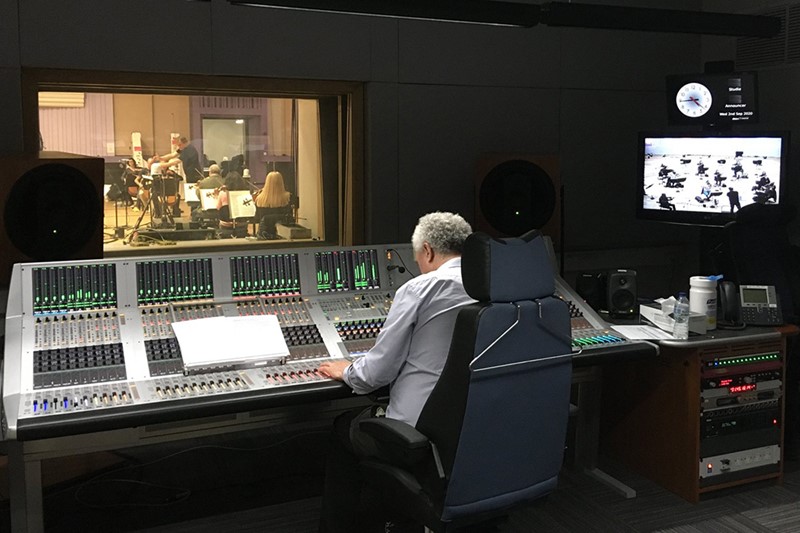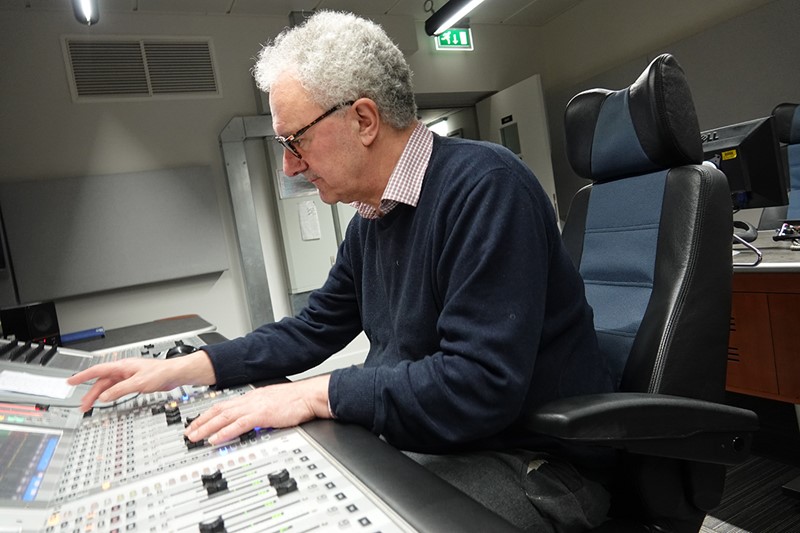Broadcasting through the pandemic: a behind-the-scenes story
Stephen Rinker
Friday, February 11, 2022
The BBC Philharmonic's Senior Technical Producer on how they kept on making music
This weekend, as part of the BBC's centenary celebrations, the BBC Orchestras and Choirs will all be broadcasting live recordings on BBC Radio 3. But while the spotlight will understandably be on the players, projects like this are only possible thanks to the behind-the-scenes expertise of highly-skilled studio managers and producers. Stephen Rinker is one such figure, and despite having spent more than 25 years with the BBC Philharmonic, the past two years presented him with some unprecedented challenges: he here reflects on how he and his colleagues kept music-making alive.
As our cultural community gives a collective sigh of relief and we return to a semblance of normality I’ve been contemplating the momentous events of the past two years! Or rather should that be lack of events?
When I think back to mid-March 2020 there is something surreal about it! On March 13 I found myself covering a live broadcast for the In Tune programme from the BBC Philharmonic’s home studio in Salford. The broadcast was tied into Sport Relief and the centrepiece was a live performance of the first movement of Beethoven’s Fifth Symphony to which members of the public were invited to run a circuit around the Media City environs before the music stopped. Beat the Beethoven! This was the last time the orchestra was to meet collectively till late August.

Senior Technical Producer, Stephen Rinker: 'My own role then as now was to look after matters audio for the orchestra'
There was of course by now more than an inkling of troubled times ahead but just over a week hence I was very much looking forward to recording Strauss’s Also sprach Zarathustra in Manchester’s lovely Bridgewater Hall. That was not to be of course - instead a set of recording schedules with the words 'Cancelled' emblazoned across them in red.
I hope it’s more than just my opinion but it’s clear to me that the BBC remains the greatest patron of music this country has. Arguably the jewel in that crown is its six performing groups. A commitment to these remained undiminished during these troubled times, but how best to use these musicians stranded in their own homes and maintain a presence on the airwaves?
My own role then as now was to look after matters audio for the orchestra. Initially we faced the baffling question of how best to get them to record themselves in the home environment? Some had extensive home studios and doubled as composer/arrangers but for many the tool at hand to record was a smartphone! The way most of these musicians responded to the challenge ahead was astonishing and I quickly became inundated with requests as to how they might make best use of their resources or even purchase new ones.
Initially we looked to solo items and some ingenious arrangements – a Bach cello suite on the tuba seemed feasible. Increasingly, though, we looked to find a way of combining these disparate elements into a unified whole, which was to culminate in Iain Farrington’s Beethoveniana written to launch the 2020 BBC Proms and utilising BBC musicians across three nations facilitated by a committed team of BBC Audio staff and production spread equally far and wide. How was this possible?
Many may be aware of something called a click track. Bread and butter for most professional musicians, it's used to synchronise to pictures or musical elements added at a later time. This typically would be generated from a sound control room and fed into the live musicians headphones. We were facing quite a different situation with players situated on their own. Their task was to playback a supplied pre-recorded click from one device and record on another. Of course the primary disadvantage they faced was the inability to hear each other in the process. Notwithstanding, a whole variety of music was recorded, some of it reaching out and touching the lives of many people.

Stephen Rinker: mixing the music for the BBC Philharmonic
Someone also came up with the ingenious idea of featuring sections of the orchestra across the various BBC groups. One such task, with the second violins, fell to me in the form of a Vivaldi concerto for four violins. In hindsight trying to synchronise Vivaldi’s throbbing ostinatos in such a way was always going to be a tall order and the initial assembly resembled a Kindergarten orchestra rather than doing justice to this team of musical athletes. In front of me I have about 30 tracks of individual violinists and by sliding these back and forth in small segments and with some careful equalisation you might never know they weren’t all assembled in some great concert hall. Well, maybe?
Thankfully a return to halls of one kind or another has finally come about but bringing with it its own set of challenges. Primarily, the socially distanced orchestra. A performance space suitable for a Mahler Symphony found itself filled by Tchaikovsky’s Serenade for Strings, our first venture since the imposition of lockdown. The problems were two-fold: the performers trying to maintain ensemble across the distance, and for the production team trying to unify these pockets of sound into a plausible sonic whole. Frankly I think we entered a whole new way of doing things, but we were pleased with what was possible and have very much built on this. So it’s been onwards and upwards. From a purely personal standpoint being able to return to the Royal Albert Hall for last years BBC Proms was a joy, and I’m sure the orchestra felt so too. As of last week we have continued our long and treasured association with Chandos, and a recording of Shostakovich’s 14th Symphony. The smallest of the composer's symphonic orchestras for sure but the darkness somehow appropriate for the times we have lived through. We finally have been able to invite an audience back to the Bridgewater hall and exiting times seem to lay ahead. Let's not speak too soon, maybe?
Stephen Rinker is Senior Technical Producer at the BBC Philharmonic
'BBC 100: Celebrating our Orchestras and Choirs' - a weekend of live broadcasts by the BBC's performing ensembles - begins tonight, Friday February 11. The BBC Philharmonic will perform a programme of Hindemith, Aziza Sadikova (a UK premiere and BBC commission), Schumann and Tippett from Manchester's Bridgewater Hall at 7.30pm tomorrow, Saturday February 12: click here for full details.
Welcome to Gramophone ...
We have been writing about classical music for our dedicated and knowledgeable readers since 1923 and we would love you to join them.
Subscribing to Gramophone is easy, you can choose how you want to enjoy each new issue (our beautifully produced printed magazine or the digital edition, or both) and also whether you would like access to our complete digital archive (stretching back to our very first issue in April 1923) and unparalleled Reviews Database, covering 50,000 albums and written by leading experts in their field.
To find the perfect subscription for you, simply visit: gramophone.co.uk/subscribe











